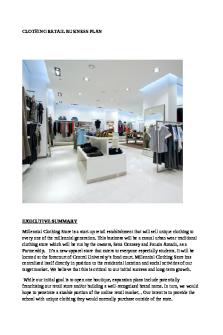Clothing Ethics uop paper PDF

| Title | Clothing Ethics uop paper |
|---|---|
| Course | PHIL ethics and social responsibility |
| Institution | University of the People |
| Pages | 4 |
| File Size | 78 KB |
| File Type | |
| Total Downloads | 56 |
| Total Views | 150 |
Summary
The Written Assignment for Clothing Ethics....
Description
Running head: CLOTHING ETHICS
1
Clothing Ethics University of the People PHIL 1404 Professor Markin 1 Dec. 2021
CLOTHING ETHICS
2 Clothing Ethics
Introduction Clothing has, for many years, been a source of derision between employers and employees. Employees reasonably want to wear comfortable clothes to work and feel that they have the freedom and right to express themselves through their dress. Employers, however, want to ensure that their employees are representing their business professionally and giving the company a good brand image. Clothing Choices Affect Work Relationships I have been out of the workforce for many, many years now—29, to be exact—and so it is difficult to answer a question like this. However, I can speak on experiences that my daughter has had. She was going through teacher training and had a superior tell her that she needed to keep her hair pulled back in a high ponytail or a bun and she didn’t need to wear dresses or paint her nails bright colors. This was so she could look more “stern” and more easily control her classroom. Another superior heard this exchange and got into an argument with the first superior, conflicting those pieces of advice and telling my daughter that there was nothing wrong with her appearance and she didn’t have to change anything. I think this example is very telling of where we are right now in terms of clothing at work: a crossroads. There are still some old-school thinkers keeping some of the outdated clothing rules in place. My daughter could not dye her hair and had to hide her tattoo while at work, for example. However, there is an emergence of more fashion freedom. However, I definitely think that how you dress affects how others view you. If a woman exposes too much skin, colleagues will think she is “sleeping her way to the top.” Or, if someone goes to a business meeting with stained and torn clothing, they would be viewed as unprofessional. As much as people want to believe their clothes do not define them, they do.
CLOTHING ETHICS
3
Workplaces Dress Codes & Ethical Importance I think that employers should be very limited in setting their dress codes in most situations. I think if an employer needs to have a set uniform, that’s fine. Obviously clothing brands would expect their employees to wear their brand as a form of advertisement. But, as far as dress code ethics go, I think that policing too harshly infringes on people’s freedom of expression. However, I also know that without standards of dress, workplaces run the risk of having their employees misrepresent them in awful ways. There is not a simple solution, but I believe that there can be a middle ground. International Dress Code & Ethics Because cultures are very different, views of dress and clothing are also very different. I think that, ethically speaking, when companies are doing business with each other it would be of utmost importance to communicate clear expectations when it comes to behavior and conduct. Rather than one company catering to the other culture, they should work together to come to a middle ground or an agreement that satisfies both sides and symbolizes the two companies working in harmony.
References Rice University. 2012. Business Ethics. Open Stax. https://opentextbc.ca/businessethicsopenstax/front-matter/preface/...
Similar Free PDFs

Clothing Ethics uop paper
- 4 Pages

Ethics Final Paper
- 6 Pages

Ethics paper outline
- 1 Pages

BACB Ethics Paper
- 3 Pages

Work ethics research paper
- 8 Pages

Ethics Reflection Paper 1
- 3 Pages

Ethics Awareness Inventory Paper
- 6 Pages

The Ethics Assessment Paper
- 9 Pages

Clothing-idioms - answers
- 1 Pages

Ethics paper peer review edits
- 5 Pages

Ethics paper - word - Grade: A
- 2 Pages

ACCT Ethics Final Reflection Paper
- 11 Pages

CLOTHING RETAIL BUSINESS PLAN
- 11 Pages
Popular Institutions
- Tinajero National High School - Annex
- Politeknik Caltex Riau
- Yokohama City University
- SGT University
- University of Al-Qadisiyah
- Divine Word College of Vigan
- Techniek College Rotterdam
- Universidade de Santiago
- Universiti Teknologi MARA Cawangan Johor Kampus Pasir Gudang
- Poltekkes Kemenkes Yogyakarta
- Baguio City National High School
- Colegio san marcos
- preparatoria uno
- Centro de Bachillerato Tecnológico Industrial y de Servicios No. 107
- Dalian Maritime University
- Quang Trung Secondary School
- Colegio Tecnológico en Informática
- Corporación Regional de Educación Superior
- Grupo CEDVA
- Dar Al Uloom University
- Centro de Estudios Preuniversitarios de la Universidad Nacional de Ingeniería
- 上智大学
- Aakash International School, Nuna Majara
- San Felipe Neri Catholic School
- Kang Chiao International School - New Taipei City
- Misamis Occidental National High School
- Institución Educativa Escuela Normal Juan Ladrilleros
- Kolehiyo ng Pantukan
- Batanes State College
- Instituto Continental
- Sekolah Menengah Kejuruan Kesehatan Kaltara (Tarakan)
- Colegio de La Inmaculada Concepcion - Cebu


